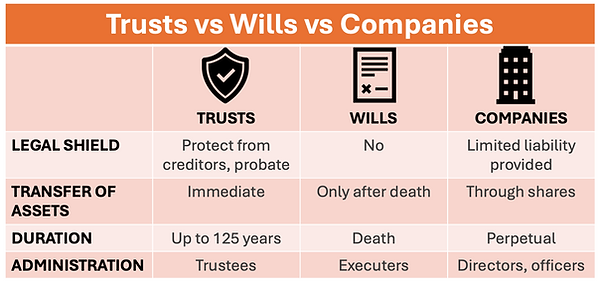Exploring Trusts
Family trusts might sound like something only billionaires use, but they're an incredibly flexible, powerful financial tool for anyone looking to secure their wealth and legacy. Family trusts are no longer just for the ultra-rich—they’re for anyone who wants control, flexibility, and security for their wealth and family.

The Concept Explained
In a world marked by rapid change and increasing financial complexity, legacy planning isn't just for the ultra-wealthy anymore. Enter the modern family trust—a structure as old as the Crusades, now reimagined for today's mobile, knowledge-driven professionals.
Under a trust, there is a person who creates the trust (referred to as a ‘settlor’). If you were to adopt our proposal, you would be the settlor.
What is a trust?
Introduction: A family trust is a legal structure in which a trustee holds and manages assets on behalf of beneficiaries. It is created by a settlor (you) and governed by a trust deed.
Key Points: Everyday Benefits
- Asset Protection: Shield your assets from creditors, divorce settlements, and legal claims.
- Tax Efficiency: Depending on jurisdiction, trusts may offer estate and income tax advantages.
- Privacy: Unlike wills, trusts are private documents.
- Control: Set the rules for how and when your wealth is distributed.
Conclusion: Think of Trusts like putting assets in a secure box with a specific set of instructions on how they should be used and who for.
Why More Professionals Are Working Through Their Family Trusts?
Introduction: Traditionally, professionals set up companies to earn income. But now, more forward-thinking individuals are working through their family trusts. Here's why.
Key Points:
-
Like business owners, professionals often have the flexibility to define how they contract for their services. This freedom enables them to structure their engagements in ways that integrate seamlessly with a trust framework—allowing the trust, rather than the individual, to be the earning party. That contractual flexibility makes it much easier for professionals to adopt and benefit from this model.
-
Placing the trust in an offshore jurisdiction can enhance both asset protection and tax efficiency.
-
Benefits: Capital accumulation, estate planning, IP protection
Conclusion: For consultants, creatives, and entrepreneurs, working through your own trust combines the benefits of business ownership with long-term asset planning.
Forming a Legacy
Introduction: A strong legacy requires a trust that can help you preserve wealth, stay agile, and avoid unnecessary complexity.
Key Points:
-
Capital Preservation: Avoiding fragmentation, forced heirship
-
Flexibility: Adapting to life changes, letters of wishes
-
Simplicity: Compared to complex business or legal structures
Conclusion: Whether you're planning 10 or 100 years ahead, a well-crafted trust provides a steady foundation for your legacy.
Estate Planning
Introduction: With careers and lives spanning multiple countries and industries, legacy planning must adapt. Trusts provide a future-proof way to manage assets and intentions.
Key Points:
-
The rise of remote work, digital nomads, global families
-
AI-driven change, career uncertainty
-
Trusts as stable, adaptable vehicles for uncertain futures
Conclusion: A trust isn't just about wealth—it's about preparing for a world in constant flux. Plan for permanence in an impermanent world.
Protect Your IP and Business Ideas
Introduction: In a knowledge economy, your intellectual property is often your most valuable asset. A family trust can protect it in ways a standard contract can’t.
Key Points:
-
How professionals can accidentally give away IP
-
Trusts as a legal filter for what’s shared with clients
-
Protecting ideas, inventions, client lists, methods
Conclusion: By placing your services and IP under a trust, you retain control while still profiting from your work. It’s peace of mind for the idea economy.
